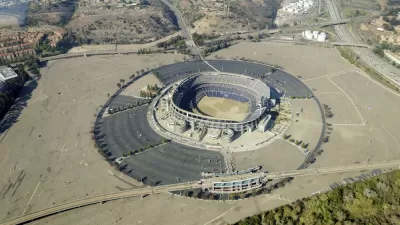Studies show building NFL stadiums drain tax revenues and don't boost local economies. What about NFL teams themselves? Land use attorney (and football fan) Bill Adams argues that they rob support from local college teams and local economies.
It's is not impossible for colleges to win or have great attendance with NFL teams next door. It's just harder. That's not good for the college teams, the college's educational and research programs, or the local economies that benefit from the college's presence, argues attorney and football fan Bill Adams.
Using his own city's (San Diego) NCAA and NFL football teams as examples, the latter of which maybe headed to Los Angeles, he cites several studies and articles to make a step by step case that: 1) colleges are important to local economies—much more so than NFL teams; 2) winning college football programs boost the number and quality of new student applications; 3) more and better new student applications result in greater funding and growth of the college; 4) the growth of the college increases the benefit to the local economy; 5) NFL teams compete with local colleges for football fans resulting in diminished attendance at college games; 6) diminished attendance means diminished support for college football; 7) diminished support means diminished success over the long haul; and 8) diminished football success reduces the number and quality of new student applications.
Obviously, a college's football program can still be successful with the NFL in town because a college can be successful without any football program. However, the presence of an NFL team is a negative pressure on a college's football program and, in turn, the college itself. It's an additional obstacle that some programs can overcome and some cannot. Therefore, if you are a football fan who likes both your NFL team and your college team, maybe its time to make a choice.
FULL STORY: Are the NFL Chargers causing the NCAA Aztecs to lose?

Alabama: Trump Terminates Settlements for Black Communities Harmed By Raw Sewage
Trump deemed the landmark civil rights agreement “illegal DEI and environmental justice policy.”

Study: Maui’s Plan to Convert Vacation Rentals to Long-Term Housing Could Cause Nearly $1 Billion Economic Loss
The plan would reduce visitor accommodation by 25% resulting in 1,900 jobs lost.

Planetizen Federal Action Tracker
A weekly monitor of how Trump’s orders and actions are impacting planners and planning in America.

Waymo Gets Permission to Map SF’s Market Street
If allowed to operate on the traffic-restricted street, Waymo’s autonomous taxis would have a leg up over ride-hailing competitors — and counter the city’s efforts to grow bike and pedestrian on the thoroughfare.

Parklet Symposium Highlights the Success of Shared Spaces
Parklets got a boost during the Covid-19 pandemic, when the concept was translated to outdoor dining programs that offered restaurants a lifeline during the shutdown.

Federal Homelessness Agency Places Entire Staff on Leave
The U.S. Interagency Council on Homelessness is the only federal agency dedicated to preventing and ending homelessness.
Urban Design for Planners 1: Software Tools
This six-course series explores essential urban design concepts using open source software and equips planners with the tools they need to participate fully in the urban design process.
Planning for Universal Design
Learn the tools for implementing Universal Design in planning regulations.
Caltrans
Smith Gee Studio
Institute for Housing and Urban Development Studies (IHS)
City of Grandview
Harvard GSD Executive Education
Toledo-Lucas County Plan Commissions
Salt Lake City
NYU Wagner Graduate School of Public Service





























